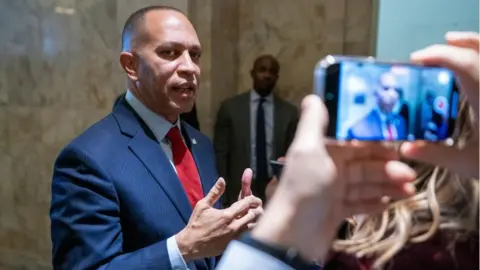Jim Jordan inches closer to House Speaker job as vote looms
Jim Jordan's bid to become Speaker of the US House of Representatives is building momentum, just moments away from a vote in the lower chamber.
The Republican has won over opponents in his own party, but a handful of holdouts remain.
The Ohio congressman said on Tuesday morning he was feeling "really good" about clinching the 217 supporters he needs to lead the House.
It would be a stunning victory for the Trump-endorsed, right-wing firebrand.
Mr Jordan is a founding member of the ultra-conservative House Freedom Caucus and seemed to be an outsider in the race, which began two weeks ago when Kevin McCarthy was ousted by rebels in his own Republican Party.
Without a Speaker, the House is unable to pass any bills or approve White House requests for emergency aid. That includes potential help for Israel amid its ongoing war with Hamas.
The number of fellow Republicans opposed to Mr Jordan had dwindled to about 10 by Monday night, down from more than 50 on Friday.
Five Republicans vote against him when the count begins on the House floor at about 13:00 ET (18:00 BST) on Tuesday, that would end or delay his chances of becoming Speaker. But there could be multiple rounds of voting.
Several moderate lawmakers had previously expressed reluctance to vote for him.
Some of them, such as Missouri's Ann Wagner and Alabama's Mike Rogers, backtracked on Monday and declared their support.
House Armed Services Committee chairman Mr Rogers wrote on social media that the two had "productive conversations" and eventually came to agree on several policy points.
In a letter to colleagues on Monday, Mr Jordan vowed to unite his party as he scrambled to consolidate support a day before the expected floor vote.
"The principles that unite us as Republicans are far greater than the disagreements that divide us," he wrote.
"The country and our conference cannot afford us attacking each other right now. It is time we unite to get back to work on behalf of the American people."
Fierce resistance to Ukraine war funding among Republican hardliners, including Mr Jordan himself, contributed to the ousting of Mr McCarthy on 3 October.
But last week Axios reported that some Republicans felt Mr Jordan had signalled that, if he were to become Speaker, he would allow the chamber to vote on linking funding for Israel and Ukraine. That would likely pass with Democratic support.
In his 16 years in Congress, Mr Jordan has faced criticism for his record. He was once labelled a "legislative terrorist" by former Speaker John Boehner.
Colleagues have also expressed concern over his past disruptive tactics, as well as his reported efforts to undermine Steve Scalise's doomed bid for the speakership last week.
Mr Scalise, a long-time deputy of Mr McCarthy, failed to win enough support.
Others have argued that Mr Jordan is not adept at fundraising. Speakers are expected to get donors to open their chequebooks for the party.
But he and his supporters are betting those opposed to him will eventually fold so as not to prolong Republicans' internal dysfunction.
 Reuters
ReutersThere are other ways this saga could end, if Mr Jordan fails to get the votes.
Some of the anti-Jordan holdouts are currently working to suggest an alternative candidate who could get more support from the party's centrist wing.
On Friday, it was Austin Scott, a little-known Georgia congressman who announced he was running for Speaker just hours before Republicans met to cast an internal ballot.
Mr Scott won as many as 81 votes for a bid he conceded was more about providing opposition than about winning the gavel.
If Mr Jordan fails, more names will be floated in the coming days.
Another way to end the House's paralysis would see acting Speaker Patrick McHenry be granted extra powers on a temporary basis - for up to 30 or 90 days.
This would allow the House to function - and avoid a government shutdown in a month's time - while a longer-term solution is found.
This would require some co-operation from Democrats to work out the details.
A third option would be for Republicans to agree with Democrats on a consensus Republican candidate.
This option, however, would entail concessions to the minority party.
Even more unlikely is that five Republicans switch sides and back Democratic Minority Leader Hakeem Jeffries for Speaker.
